What is Bixi?
If you walk around downtown Montreal, you’ll eventually run into one of these:
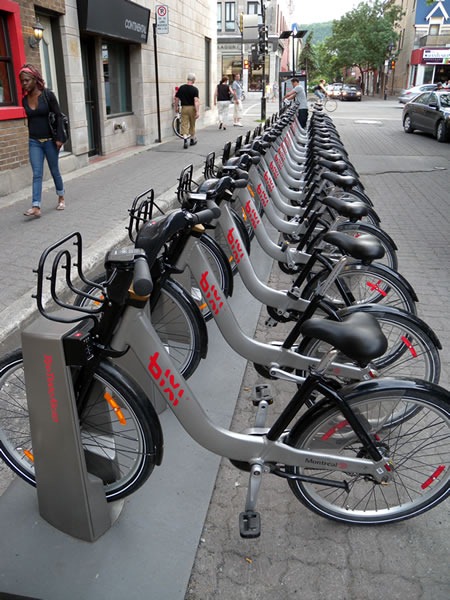
It’s one of 400 docking stations for Bixi, Montreal’s public bicycle sharing system. You shouldn’t think of Bixi as a bicycle rental service – instead, you should think of it more as self-powered public transit. With Bixi, you check out a bike at the Bixi station closest to your starting point, bike to the Bixi station closest to your destination, where you check it in.
In Montreal, there are 5,000 bikes in Bixi’s system, which was introduced last summer. Since then, a number of cities have signed up to purchase and install Bixi systems, including:
- Boston (2010)
- London (2010)
- Melbourne (May 2010)
- Minneapolis (June 2010)
- Toronto (May 2011)
- Washington DC/Arlington (Fall 2010)
- Washington State University (Fall 2010)
Bixi Rental Rates
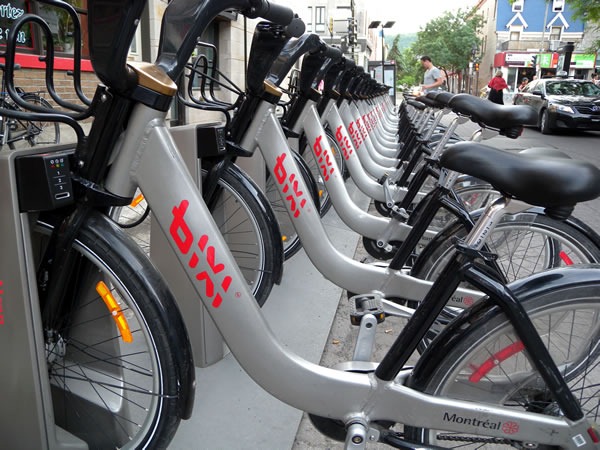
You can rent a bike in one of two ways:
You can purchase a subscription to the service online. This entitles you to unlimited rentals. Subscriptions are available at these rates:
- $5 per day
- $28 per month
- $78 per year (a killer deal, if you do the math)
With a subscription, bike rental is free if each trip between docking stations is under 30 minutes (other than the number of hours in the day, there’s no limit to the number of trips you can make). Trips longer than 30 minutes are charged as follows:
- $1.50 for the second 30-minute period
- $3.00 for the third 30 minute period
- $6.00 for subsequent 30-minute periods
You can pay at the docking station on a per-use basis. This is the pricier approach, aimed at tourists and people who cycle only occasionally. The rates are:
- $5 for the rental fee, which includes 30 free minutes
- $1.50 for the second 30-minute period
- $3.00 for the third 30 minute period
- $6.00 for subsequent 30-minute periods
The increasing prices are meant to discourage people from “hogging” the bikes; they’re meant to keep them in circulation.
Checking Out a Bike
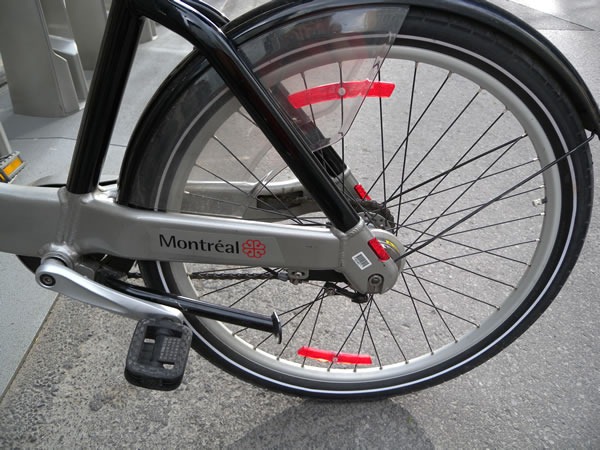
While in Montreal this past weekend, I decided to take a Bixi bike for a spin. I went to the docking station closest to my hotel, at the corner of Rene-Levesque and Mansfield. It’s a popular station; there were only two bikes left on that Saturday afternoon at about 4:30 p.m..
Like all Bixi stations, it had a map showing the locations of the Bixi stations, with that particular station highlighted:
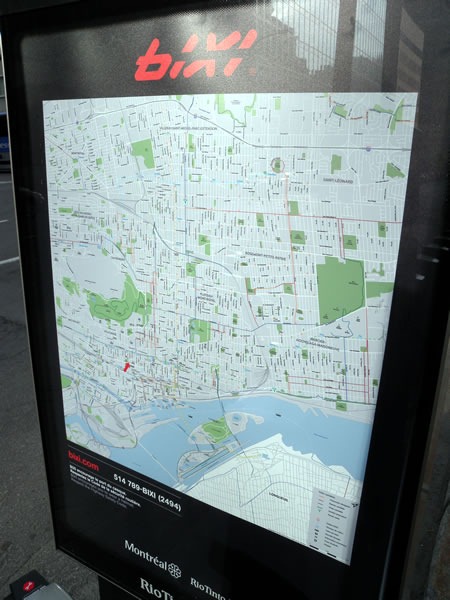
…as well as a control panel for renting a bike.
To rent a bike at the station, you touch the screen, which prompts you to swipe a credit card. Once your credit card has been authorized, you’re given a passcode which you use to unlock a bike. You can either have the passcode displayed onscreen (which means you have to memorize it) or have it printed out on a small ticket.
Although I have great faith in my memorization skills, I have even greater faith in Murphy’s Law. I opted for the printout.
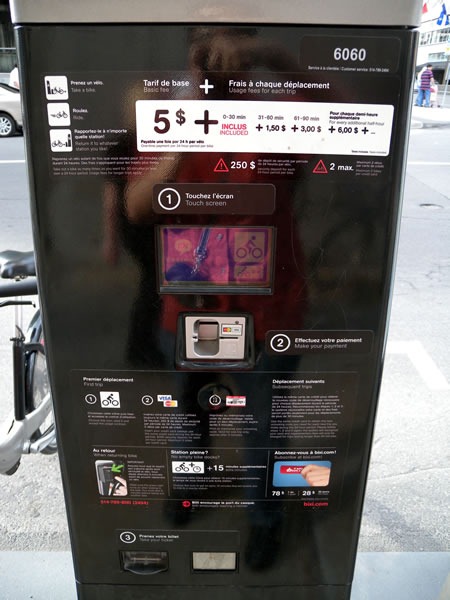
Once you have your passcode, it’s time to unlock your bike. The passcode is a five-digit number using only the digits 1, 2 and 3. You unlock a bike by typing that passcode using the keypad on the bike dock. If you entered your passcode correctly, you’ll see a green light and the electronic lock will release the bike.

The first bike I checked seemed in good shape and had full tires, so I entered my code and undocked it. I quickly adjusted the seat to match my height:

…and it was time to hit the road!
The Bixi Bike Experience
Here’s a look at the handlebars of a Bixi bike. The plastic covering on the handlebars serves two purposes:
- To provide a place for additional instructions
- To cover the brake and gear cables, protecting them from the elements and meddlesome users
The “basket” and integrated bungee cord are good for holding small packages and bags.
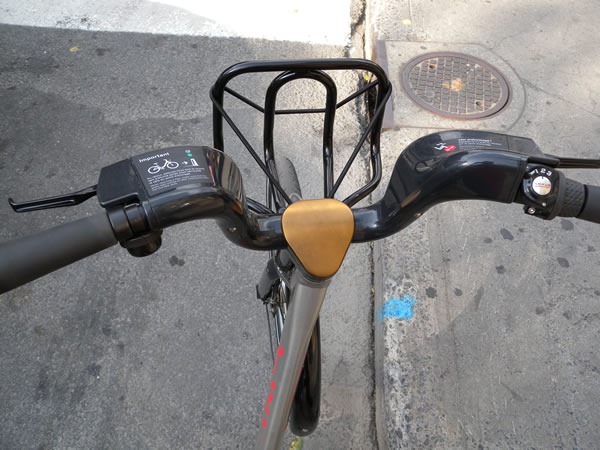
Here’s a close-up of the plastic covering over the left handbrake. It explains the finer points of returning a bike to the dock once you’re done with it:

Here’s a close-up of the plastic covering over the right handbrake. It shows you how to report a damaged bike when returning it to the dock:

Here’s a shot of the rear wheel and pedals. Note that wherever possible, mechanical parts are sealed away out of view and harm’s way.
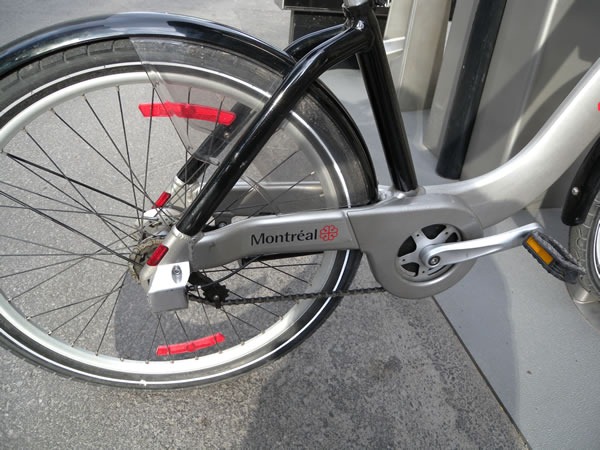
Bixi bikes are three-speed; they have a Shimano grip-shifter mounted on the right handle. You’re not going to win any races nor do any serious bike courier work on these gears, but it’s more than enough for city biking.
I didn’t have anywhere to be in a hurry, so I was using the bike like a velo-flaneur, doing a lot of looking around and just wandering where the road and the occasional whim took me. I kept a casual pace and stayed mostly in second and third gear, switching only to first gear for that hill going up St-Laurent from Ste-Catherine to Sherbrooke.
The bike has nice fat nitrogen-filled tires, and I found the ride to be pretty smooth. The gears shifted smoothly, although I noticed the occasional lag between gear changes as I shifted downwards – a mild annoyance rather than a serious problem. The chain was well lubed, and pedalling took very little effort. The brakes were nice and tight, requiring only a little squeeze before they engaged – they felt like my bike’s brakes just after a tune-up. The frame itself – a one-piece aluminum affair designed by Michel Dallaire with metal provided by Rio Tinto Alcan – was light (light for a “cruiser” style bike, anyway) and solid-feeling.
I made a quick jaunt from the Queen Elizabeth Hotel (where I was staying) to Old Montreal, where I tooled about its winding streets and caught some kind of festival, through le Quartier Chinois to the shops on St-Laurent north of Sherbrooke. From there, I checked out some of my old haunts in the McGill “student ghetto”, and then it was back to the docking station where I’d checked out the bike because I had a dinner reservation to catch.
Returning the Bike
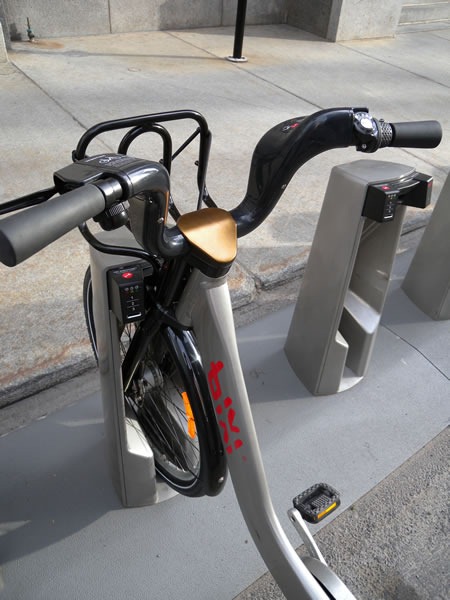
Returning the bike is easy – you find an empty dock and “plug” your bike into it. A green light confirms that you’ve locked the bike and that your rental session is over. If your bike is damaged in any way, you can report it by pressing the “report damage” button. I’d gone over a half-hour but was under an hour, so my total charge was $6.50.
Thoughts on Bixi
Bixi is a Montreal-based company, and its bike sharing system seems to work well there. While walking about during my stay there over the past couple of days, I saw more than a dozen people on Bixi bikes, and saw even more during my Bixi bike jaunt on Saturday afternoon.
Montreal has a couple of advantages that make it suitable for a bike sharing system:
- Dedicated two-lane bike lanes, which are separated from the street with actual physical barriers.
- A strong attachment to public transit and cycling, which comes from its European “feel”, large student population and well-regarded public transit system.
- Limited geography: the city is an island.
Will the Bixi experience in Montreal “translate” to Toronto? I don’t know.
Toronto is more “American” than Montreal, so many more people there perceive bikes as toys rather than serious vehicles. A number of Toronto politicians have know-nothingly painted bicycle activism as “the war on the car” and at least a couple of them have attempted to turn modest proposals to get more dedicated lanes on city streets into an issue for the upcoming mayoral election (with opposing them seen as a way of getting more votes).
There’s also the matter of city coverage. When the Bixi project launched in Montreal, they started with 300 stations and 3,000 bikes, which meant that a for a good part of the city, it was likely that there was a Bixi docking station nearby and it was likely that that station would have at least one bike available. Since then, those numbers have been boosted to 400 stations and 5,000 bikes. You see both stations and bikes (both docked and in use) everywhere.
Despite the fact that Toronto has a population larger than Montreal’s, we’re launching with 100 stations and 1,000 bikes. I assume that most of them will be in the core, with the concentrations heaviest around the streets with bike lanes or a high hipster quotient. Will it be enough stations and bikes? We’ll find out as the service launches.
Finally, there’s the question of whether the bikes will get used in the winter. One of the favourite arguments of opponents of bike lanes is that nobody bikes in the winter. While cycling is reduced, there are still many cyclists on the street of Toronto in the winter months. Toronto doesn’t get anywhere near as much snow or anywhere as cold as Montreal, and even they have a year-round biking culture. As a year-round cyclist who regularly shuttles between High Park and downtown Toronto on his bike, I can say with certainty that winter cycling in Toronto is no big deal.
I’m in Montreal every couple of months for conferences, so I think I’d end up using Bixi when visiting. These events often call for quick errands to be run, and being able to get a bike would come in handy.
Would I use Bixi in Toronto even though I live in the city and have my own bike? There are times that bike rental would come in handy. For the rare times when I drive downtown or the more frequent times when I take the subway downtown but have to run errands all over the place, Bixi would come in handy.
I’m looking forward to seeing Bixi in Toronto. We’ll have to see if it works out.



